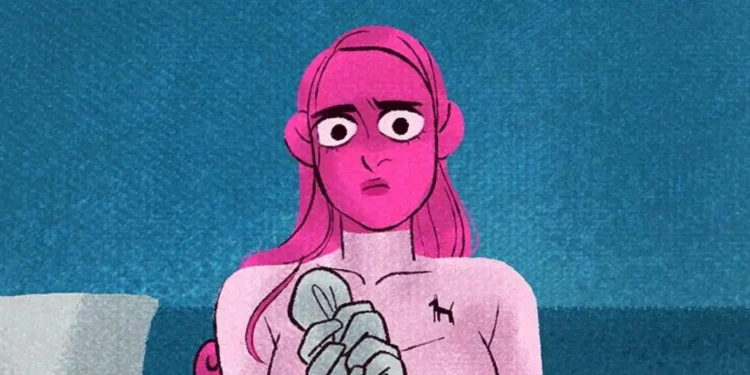Rachel Smythe’s illustrations and her creative storyline have transformed Lore Olympus into a best-selling webtoon. Adapting Greek mythology’s emotional depth and tragedy, Smythe beautifully portrays the complexity of love and betrayal. Lore Olympus Chapter 155 gives us crucial insight into how relationships define genders’ approaches to domestic issues. As we delve into Lore Olympus Chapter 156-163, we witness the intricate tapestry of relationships evolving, secrets surfacing, and characters confronting their vulnerabilities.
Lore Olympus Chapter 156: Kore’s Family

Lore Olympus Chapter 156 opens with Persephone receiving an unexpected call from her family, who have come to the Underworld in search of her. Filled with excitement, Persephone informs Hades, and together, they meet her family. Upon their arrival, she joyfully greets her sisters, sharing a heartfelt moment of reunion. Shortly after, she introduces Hades to her sisters.
One of the youngest sisters presents Hades with a thoughtful gift—a cow—as a token of appreciation for taking care of their goddess. Hades graciously accepts the gift and, noticing the cold, invites them all inside to warm up. Persephone’s sisters bring life and cheer to the normally somber palace of Hades. Amid the playful chaos, one of the sisters mentions they are having trouble managing the books.
Persephone, surprised, asks if Kyamos, who usually oversees those tasks, isn’t handling it. The sister explains that Kyamos left after a dispute they had, leaving them unsure of how to manage the accounts. Realizing her skills could help, she agrees to look into the matter. The chapter shifts as Daphne arrives at the scene, accompanied by Thanatos, adding to the unfolding events. The final part of the Lore Olympus Chapter 156 sees Leto arriving and inquiring where the kitchen is, closing the chapter with an air of anticipation.
Chapter 157: The First Dance

Lore Olympus Chapter 157 begins with a lively scene where all of them are dancing and enjoying themselves. Amidst the festivities, Persephone poses a hypothetical question to Hades, asking him what would have happened between them if she hadn’t blacked out at the party when they first met. He responds playfully, saying that he would have asked her to dance. He imagines folding her in close and whispering something sweet to her.
The scene transitions to Persephone washing dishes in the kitchen. Leto arrives and offers her help, which Persephone politely declines, saying she can manage independently. She shifts the conversation, subtly implying that Persephone might no longer be interested in Hestia’s establishment. This prompts Persephone to ask who she is referring to. But Leto presses on, commenting on how few eligible goddesses are left these days and expressing disappointment about the situation. She mentions that Hades might seem appealing but wonders if Persephone has considered anyone else.
Persephone’s demeanor shifts and tension rises when Leto brings up Apollo. The mention of his name triggers visible fear in Persephone, showcasing her trauma and vulnerability. She demands to know who Leto really is, marking a significant turn in the chapter as Persephone’s unease deepens. Lore Olympus Chapter 157 ends on an intense note, leaving readers with a strong sense of foreboding and anticipation for what might come next.
Lore Olympus Chapter 158: Leto Trying to Convince

Lore Olympus Chapter 158 starts with Hades questioning Thanatos about Minthe, suspecting his closeness to her. He shares that Persephone lost control at work, turning Minthe into a plant, and that efforts are underway to restore her. Noticing sunlight in the Underworld, Hades sees Leto departing.
The scene shifts as Persephone confronts Leto, who suggests a powerful union between Persephone and Apollo. Leto introduces herself as Apollo and Artemis’ mother and insists that Apollo is heartbroken, urging Persephone to reconsider. Persephone counters, recalling Apollo’s threatening words: “I don’t need you to like me to be my wife,” and declares she would never want a man capable of harming her. She makes it clear her respect for Artemis is the only reason she hasn’t summoned Hades yet.
Persephone apologizes, acknowledging that only a mother could love Apollo as Leto does, but states that Apollo’s feelings are unreciprocated. Despite the uncertainties ahead, she firmly asserts that she will never marry Apollo. Leto warns that choosing Hades might strain her relationship with her mother. Persephone retorts that her mother should not be involved. Sensing Persephone’s resolve, Leto acknowledges her willingness to accept Hades’ baggage but subtly hints that Persephone may not know everything about Hades and Hera. The Lore Olympus Chapter 158 ends with Leto leaving and Persephone deep in thought.
Chapter 159: The Therapy

Lore Olympus Chapter 159 begins with Hades storming into Leto’s presence, visibly angry. He firmly tells Leto that no Sun God is allowed in the Underworld and questions her actions. Leto, remaining composed, responds that she is just about to leave and departs shortly after. Following this encounter, Hades goes to Persephone to check on her well-being. When he asks if she is okay, Persephone gives a brief response, deflecting further inquiry. Persephone expresses gratitude for how kind he is to her family. She then bids him goodnight and leaves.
As Persephone returns to her room, her mind replays her conversation with Leto. In that discussion, Leto revealed that Hades had once asked Hera to be the queen of the Underworld and that they had an on-and-off affair spanning years. This revelation deeply unsettles Persephone. She becomes overwhelmed with insecurity, wondering how she could ever compare to Hera, who embodies power and perfection as the queen of the gods. With tears streaming down her face, she spots a therapy card that she previously received from Hera and decides that seeking professional help is necessary.
The narrative shifts to Hades driving Persephone to her therapy session. Once they arrive at the therapist’s office, the therapist warmly introduces herself and shares some details to build rapport with Persephone. As their session begins, Persephone admits that she has been under significant stress recently. Lore Olympus Chapter 159 ends with Persephone reflecting on the challenges she’s faced, including pressure from her scholarship, her mother, and other stresses.
Lore Olympus Chapter 160: The Therapy Continues

In Lore Olympus Chapter 160, Persephone’s session with her therapist begins uniquely as she uses a whiteboard to share her past. The therapist probes whether Persephone feels guilt transitioning into adulthood, pointing out Demeter’s strict expectations. Persephone agrees, admitting self-disappointment.
The therapist explains that children praised only for achievements often feel like failures when not constantly productive. While Demeter’s support isn’t wholly absent, Persephone’s perception of disappointment may be amplified. She stresses that gratitude for support is valid, but Persephone’s autonomy and dreams should be respected.
The discussion turns when the therapist asks what the worst consequence would be if Persephone left TGOEM. Persephone acknowledges her fear of universal disappointment, having prepared for this role throughout her entire life. The therapist offered her reassurance, explaining that worth is not dependent on productivity, and suggested an exercise to help her visualize true happiness.
The chapter shifts to Hera, who seeks Asclepius’s help for her wound. He advises rest and departs. Apollo then appears, using his visit to influence Zeus regarding Persephone. When Zeus resists, Apollo subtly accuses him of favoritism and leaves, creating tension. The Lore Olympus Chapter 160 ends ominously, hinting at upcoming conflicts involving Apollo’s relentless pursuit and Zeus’s protective stance.
Chapter 161: Kore opens Up About Her Trauma

In Lore Olympus Chapter 161, Persephone shares her trauma with her therapist, expressing frustration and powerlessness despite her immense abilities. She recounts freezing during the traumatic event and feeling trapped by memories that haunt her and influence her life. The therapist empathizes, explaining the freeze response as a natural reaction to fear and stress, and praises Persephone’s courage in sharing. She reminds Persephone of her supportive friends and encourages self-compassion during healing. Kore is reassured by her that she is not bound to her abuser. She emphasizes that with time and support, she can break free from the feeling of being tethered to her trauma. This comfort provides a sense of relief.
The scene shifts to Hades, who waits for Persephone in the lobby with a bouquet. He nervously jokes about giving the goddess of spring flowers. Noticing her distress, he asks if she is okay. She admits she isn’t fully okay but is healing. During their drive, Hades apologizes, worried he upset her at a recent party, mentioning her distance since then. She begins by explaining she felt overwhelmed when Leto referenced his past with Hera. Hades, caught off guard, suddenly breaks, ending Lore Olympus Chapter 161 with tension and unresolved revelations.
Lore Olympus Chapter 162: The Past Relation

In Lore Olympus Chapter 162, Hades and Persephone discuss a sensitive topic as they drive. He suggests continuing at home for better privacy and context. Upon reaching, he opens up about his past with Hera, revealing that while they once shared deep feelings, time changed their bond to one of respect and friendship. At the time, romantic options for immortals were scarce. Hera was admired by many, including Zeus and Poseidon.
Hades introduces Persephone to the tale of “the Six Traitors Dynasty” and Hera’s role as “the Golden Traitor.” He recounts how, during the Titanomachy, Kronos’s control over time posed a significant threat, but his unstable state was their advantage. Hera played a crucial role by gaining Kronos’s trust and secretly poisoning him with a toxic plant— the same one Zeus used to free Hades and Poseidon. Despite Metis’s disapproval, Hera and Zeus pressed on, succeeding at great cost.
Kronos’s discovery of Hera’s betrayal leads to a brutal retaliation, where he captures her and tears her apart. Hades expresses regret for failing to protect her, acknowledging her sacrifice that brought victory but felt hollow. Hera’s reputation suffered as she was dubbed “the Golden Traitor.” The Lore Olympus Chapter 162 ends with Zeus asking Hades about becoming king, adding tension to the story.
Chapter 163: Hera Refuses Hades’s Proposal

In Lore Olympus Chapter 163, Hades is confronted by Zeus, who proposes that he take on the role of King of the Underworld. He hesitates, expressing uncertainty in his ability to rule. Zeus outlines a shared leadership: Zeus as King of the Gods, Poseidon over the seas, and Hades ruling the Underworld due to his unique expertise. Hades doubts the idea, noting the Underworld’s isolation, but he assures him of visits and mentions that Hades could oversee their father Kronos’s imprisonment as a form of justice for past suffering.
Demeter’s sudden arrival cuts their conversation short, demanding Zeus’s attention. Hades asks Hera if she will join him in the Underworld, but she declines, stating her destiny as Queen of the Gods. This shift signals a new chapter for the siblings, with Hades realizing the burdens of his title and the flaws in Zeus’s rule.
Hades reflects on a moment of intimacy with Hera—an act of rebellion against Zeus. While uneasy, he confesses this to Persephone, who appreciates his honesty. Feeling vulnerable, she compares herself to the powerful Hera. Hades reassures Persephone, emphasizing that his past with Hera lacked real affection. Hades’s candor relieves Persephone, and he hints at more truths to share, sparking Persephone’s anticipation of what follows, ending Lore Olympus Chapter 163.
Lore Olympus Chapter 156-163: Conclusion
Lore Olympus Chapter 156-163 offers stiff competition and testimony to the desire for growth, change, and entanglement while still remaining quite relatable. The developing relationship between Hades and Persephone is fascinating to see as it depicts classic issues. Questions, comments, and feedback are welcome in the sections starting below. What do you think will happen next in the chapters? What did you think about how the chapters were illustrated? Please leave your thoughts in the comments section of the discussion. We will be resuming our content on “Lore Olympus“ in the next part.








